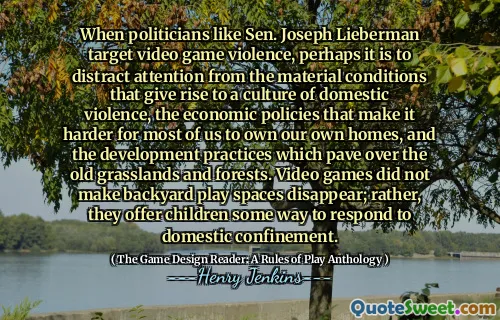
When politicians like Sen. Joseph Lieberman target video game violence, perhaps it is to distract attention from the material conditions that give rise to a culture of domestic violence, the economic policies that make it harder for most of us to own our own homes, and the development practices which pave over the old grasslands and forests. Video games did not make backyard play spaces disappear; rather, they offer children some way to respond to domestic confinement.
This quote highlights a critical perspective on the socio-political narratives surrounding video game violence. Often, society and policymakers may target specific entertainment mediums to divert attention from deeper systemic issues, such as economic inequality and environmental degradation. The assertion that video games serve as a coping mechanism for children confined by domestic and social circumstances offers a nuanced understanding of their role beyond mere entertainment. Instead of viewing them solely as contributors to negative behavior, the quote suggests that video games function as a form of escapism or response to real-world constraints—such as lack of safe outdoor spaces or familial stress. Drawing upon concepts from game design as a reflection of real life, it underscores the importance of recognizing how cultural products interact with societal conditions. For instance, when physical outdoor spaces are diminished or unsafe, children might turn to digital worlds not as a cause but as a consequence of urban development and economic policies. This reframing enables a deeper appreciation of video games as a complex cultural response rather than a superficial villain in social problems. It also calls for a broader societal reflection on the root causes of issues like domestic violence and inadequate community infrastructure, rather than focusing solely on censors or bans on cultural issues that might seem inconvenient. Overall, the quote invites us to consider how entertainment and media functions as part of a larger socio-economic landscape and challenges simplistic scapegoating narratives.






